How much time should you invest in SEO vs. social media? Many articles argue that one is more important than the other.
A better approach is to understand the different roles that these two marketing approaches play, and then you can make an informed decision in the context of your own website goals.
But first, let's go over some simple definitions before we compare SEO vs. social media.
In This Article
SEO and Social Media Defined
SEO stands for search engine optimization. It’s the practice of optimizing web pages to rank well in search engine results.
Social media marketing involves publishing or advertising on platforms like Facebook, Twitter, Instagram, Snapchat, WeChat, TikTok, and YouTube.
Social media and SEO require creating content to attract an audience.
Along with other types of marketing, like email, SEO and social media are tools to reach audiences.
As you may have guessed, it’s a matter of matching the right tool to the right job.
The Big Picture: See-Think-Do
An easy way to understand how SEO and social media compare is to use a framework called See-Think-Do.
It's simple. Every business has a target audience. And everyone in that target audience is in one of these 4 stages.
- See: People in the See stage are finding out about your brand for the first time.
- Think: People in the Think stage are thinking about what you have to offer.
- Do: People in the Do stage are ready to buy from you.
- Care: These are existing customers who’ve purchased 2 or more times from you and have an affinity for your brand. (The goal of marketing to the “Care” stage is to wow them with appreciation and maintain customer loyalty.)
Marketing legend Avinash Kaushik created this framework.
As Kaushik explains, to market effectively to these stages, you must:
- Create content suited for each stage.
- And deliver that content via channels (i.e., types of marketing) that are effective for that stage.
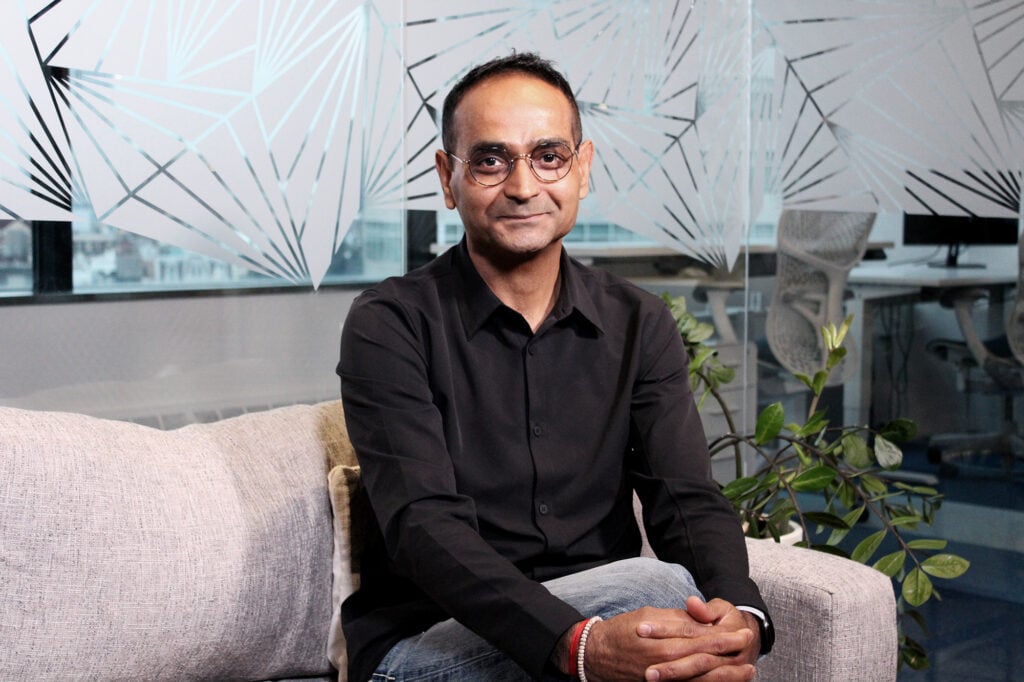
SEO and Social Media: Good For Which Audience Stage?
Based on his career consulting for top global brands, Kaushik's framework shows that to reach audiences in each stage, some types of marketing typically work better than others.
For example,
- Social media is effective for reaching people in the See stage.
- SEO works well for the See, Think, and Do stages.
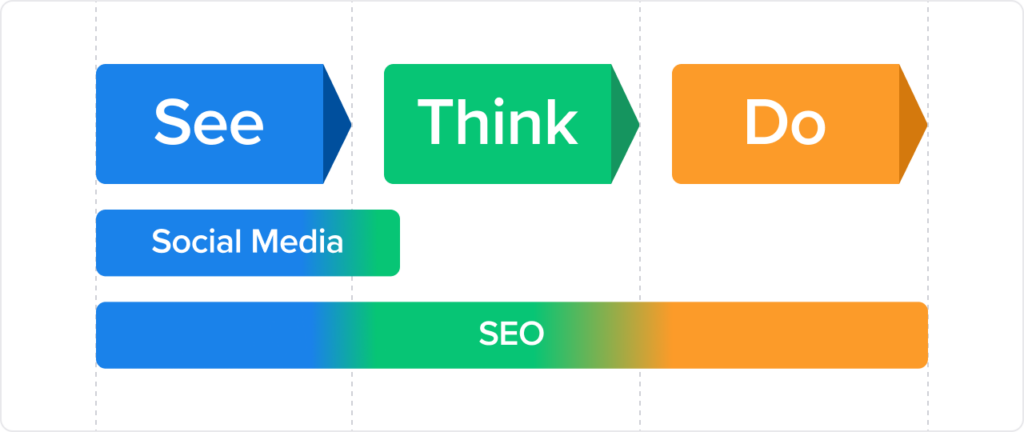
Now, let’s take a closer look at social media.
Facebook: A Social Advertising Platform
Did you know Facebook has low “organic reach” for business and organization pages? Organic reach refers to the percentage of your fans seeing your posts in their newsfeeds.
Marketers estimate this “organic” (or “free”) reach is between 2%-6% of all your fans. Want to reach more of your fans? Then you'll have to pay to advertise your post.
Facebook may eventually require businesses to pay to reach anyone at all. And that's ok. Because for businesses, Facebook is most effective as a social advertising platform.
Newsfeed-Based Social Media vs. YouTube
Now, let’s add a bit of nuance. Facebook and Twitter are what we call “newsfeed-based” social media platforms. These newsfeeds feature friends’ posts and some organization posts and ads.
And as you've noticed, newsfeeds move fast.
When you post a tweet, it’s quickly buried and replaced by dozens of other tweets.
By contrast, YouTube has no newsfeed. People search for topics that interest them and subscribe to their favorite channels.
YouTube’s design and algorithms have made it a very effective platform for reaching people in the Think stage. Indeed some people who find your “Think” content on YouTube will also see your brand for the first time.
So let’s adjust our chart to reflect that YouTube’s effective for your audience in the Think stage and for some in the See stage.
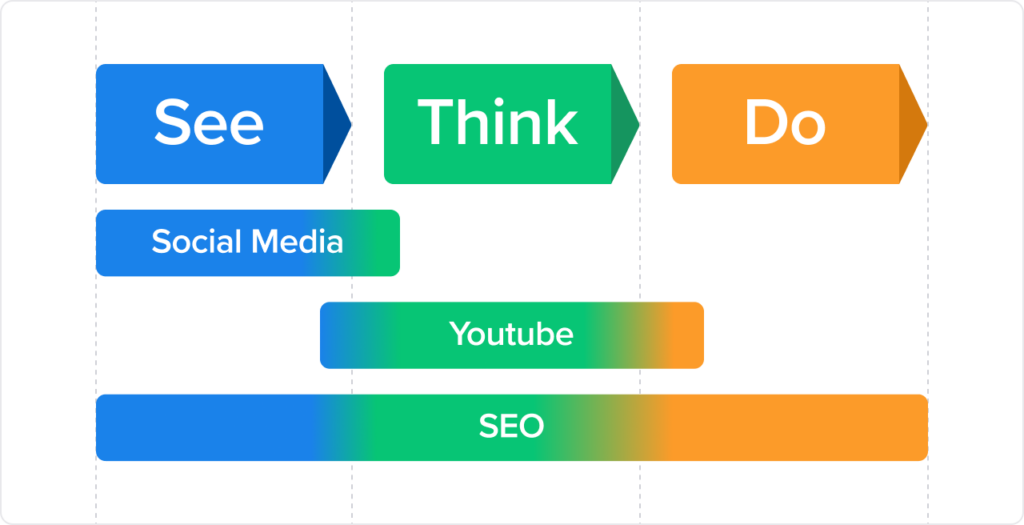
SEO: Reaching See, Think, and Do
Now, let's return to SEO. Small businesses can use local SEO to display images, ratings, hours, maps, and more. And this is an excellent way to boost awareness of your business.
Next, by doing keyword research, you can create content that reaches your target audience in all three stages: See, Think, and Do.
(If this is all new to you, don't worry. Check out this simple introduction to keyword research.)
With SEO, results are seldom immediate. It takes patience and discipline to reap the benefits of search engine optimization. No one can predict how long it will take to see results. But a high-quality article can rank in hours.
Here's where social media marketing can be beneficial. You can get in front of your target audience immediately on Facebook and experiment with ways to drive traffic back to your website. But realize it’ll take a little ad spending to do this. (You can get going for $50 or less.)
Also, recognize that social media platforms like Facebook have great SEO built into them. So you can also create posts on your Facebook page that rank high in Google search engine results pages (SERPs) for topics (keywords) you're targeting.

Now that you understand the roles of social media and SEO better let’s take a quick look at common tactics. You’ll get a richer picture of how and why these tools work. And you will get some ideas for your digital marketing strategy.
Ways to Use Social Media: Build Brand Awareness
Use news-feed-based social media to introduce your target audience to your brand. Think of it as introducing yourself at a party.
Facebook is effective for this. Since people are there to socialize, create engaging content that doesn’t require much attention. Think “snacks” – small bites of entertaining, charming, or surprising information.
These content snacks can be:
- Interesting trivia or statistics
- A colorful anecdote
- A funny story
- A personal recollection
- An appealing photo.
Use Facebook Ads to Build Brand Awareness
With Facebook Ads tools, you can build an audience that matches your target audience. You can select dozens of characteristics, from demographics to other Facebook Pages they've liked.
For example, if you sell cowboy hats, you can create an ad “audience” of people who like trail riding, rodeos, classic Westerns, and country music.
Then, promote some of your “content snacks” to this audience and watch your brand awareness grow.
Gradually, give some of your new Facebook friends a reason to visit your site so they begin to Think about what you offer.
Does Social Media Impact SEO?
As people get to know your content, they'll link to it. Backlinks from your Facebook friend’s websites can support your SEO.
But be aware that social signals, such as “likes,” shares, and comments, do not impact your website’s rankings.
That said, you can create Facebook posts focused on your target keywords. If done well, those Facebook posts may rank higher in search results for that keyword than your website does. These optimized Facebook posts can boost awareness and drive traffic to your site.
Ways to Use SEO: Grow Your Audience With No Ad Spend
We mentioned that to create content that ranks, choose a topic (keyword) you want to rank for.
Choosing a keyword to base your content on is a powerful way to drive conversions and sales. Why? Because it's possible to identify keywords that signal commercial or buying intent.
Someone with commercial or buying intent is either considering a purchase (Think) or is ready to buy now (Do).
For example, when people search for “insurance,” it's hard to know their purpose.
But, if they search for “cheap car insurance quotes,” that's specific and indicates commercial intent.
Target your audience in the Think and Do stages with
- Product comparisons (for your products and competitors')
- Free downloadable e-books, webinars, or online courses
- Problem-Solution articles: How your product, service, or idea solves a problem.
Do You Need Help With SEO?
While SEO may seem intimidating, WordPress site owners can use a plugin to simplify and streamline the process.
We recommend the All in One SEO (AIOSEO) plugin. This established plugin has over 3 million users and thousands of 5-star ratings on WordPress.org.
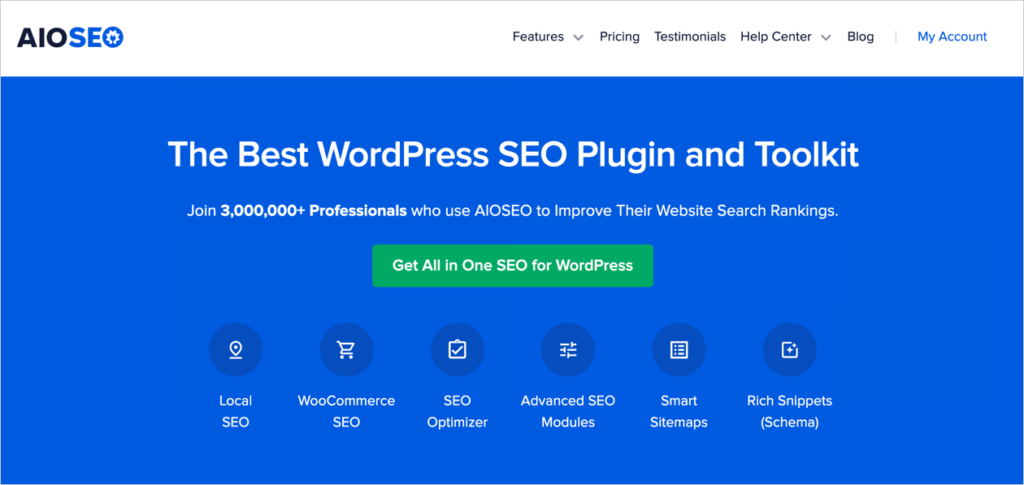
The plugin is easy for beginners yet provides the results that businesses need.
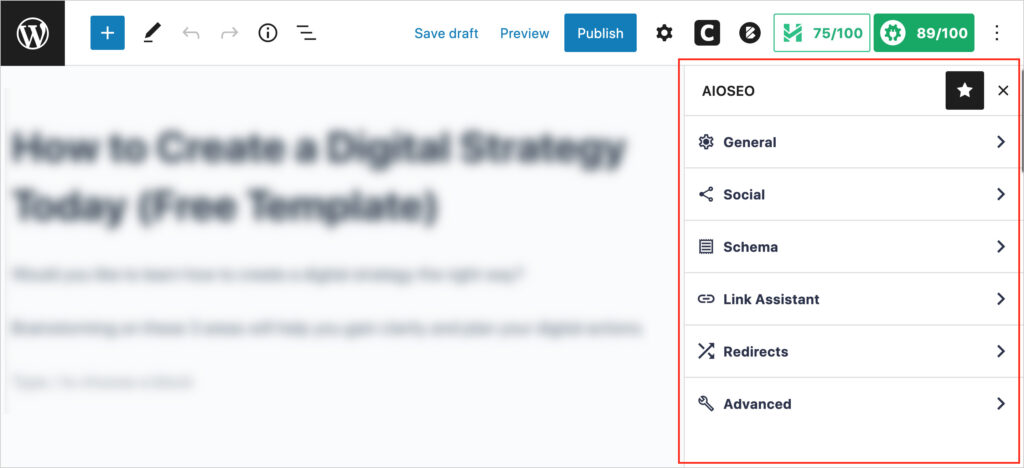
It includes:
- Suggestions for improving your web pages so they rank higher.
- Guidance for link-building. (Internal and external links are ranking factors.)
- Click-button ways to make your pages eligible to be displayed as “rich snippets.” You can think of these as super-deluxe search displays. Here’s an example.

Plus, you'll have access to skilled support professionals and educational materials on the blog and the AIOSEO YouTube Channel.
Takeaways: How SEO and Social Media Can Work Together
We've seen interesting overlaps between SEO and social media:
- Facebook Ads can be an effective way for small businesses to grow brand awareness.
- But Facebook Page content can appear in search results and drive organic website traffic.
- And both SEO and YouTube work very well to reach target audiences in the “Think” stage.
Summing Up: SEO vs. Social Media
While getting engagement on social media is easy, interactions are not the same as business outcomes. So be careful. It's easy to over-invest resources in social media.
If you use newsfeed-based social media, expect to spend at least a small amount of money on advertising to get noticed.
To succeed with SEO, you need high-quality content. And that takes discipline to create. However, high-ranking content has tremendous power to drive conversions and sales. It even presents unique opportunities to poach traffic from your competitors.
And plugins like All in One SEO (AIOSEO) will make technical SEO tasks as easy as clicking buttons and filling out form fields.
Revenue is More Important than Traffic
Lastly, remember that revenue is more important than website traffic. And the quality of your organic traffic is more important than its amount.
Consider: It's possible to have a low-traffic article make more money than a high-traffic one if you’re attracting people ready to buy.
Imagine a company that sells a $500 product. Which article is more valuable? Article A? Or Article B?
| Average traffic/mo | Average conversion rate/mo | Average revenue/mo | |
| Article A | 500 | 2.4% | $6,000 |
| Article B | 10,000 | 0.02% | $1,000 |
Q&A on SEO vs. Social Media
What's the primary goal of social media users vs. search engine users?
The primary goal of many social media users is to pass time or socialize. In contrast, search engine users want to find high-quality information related to their search query.
An exception is YouTube. This social platform, which features a dedicated search engine and subscription model, attracts users willing to explore topics in-depth. By comparison, newsfeed-based social media platforms require advertising to achieve significant reach.
Is SEO becoming obsolete?
No, SEO is not becoming obsolete. Excitement over the releases of ChatGPT and Bard had many pundits wondering whether these tools signaled the end of search engines. But as we've seen, both Google and Bing have incorporated these AI features into their search engines to enhance user experience.
Google Search powers billions of dollars in international commerce. And Google Ads alone provides over 80% of Alphabet's $187 billion annual revenue.
Search engines provide a necessary filter to help users navigate billions of online pages and products. The form factor for that search will continue to evolve, but the need for a sorting mechanism, and a way to rise above the competition, will always exist.
What’s Next?
Few small businesses can succeed without an SEO strategy, but exceptions exist. Food trucks and some rare word-of-mouth consultants come to mind.
While some marketers exaggerate the role of social media, clever use of it can help you reach your goals.
We hope this article helped you understand the different roles that social media and SEO can play in your marketing efforts.
You may also like our tutorial on using FAQ schema to get traffic from your competitors’ prospects. And explore how to write meta-descriptions that get more click-throughs.
If you found this article helpful, please subscribe to our YouTube Channel. You’ll find lots of tutorials there. You can also follow us on Twitter, LinkedIn, or Facebook to stay in the loop.
Photo of Avinash Kaushik courtesy of Croud.
Disclosure: Our content is reader-supported. This means if you click on some of our links, then we may earn a commission. We only recommend products that we believe will add value to our readers.
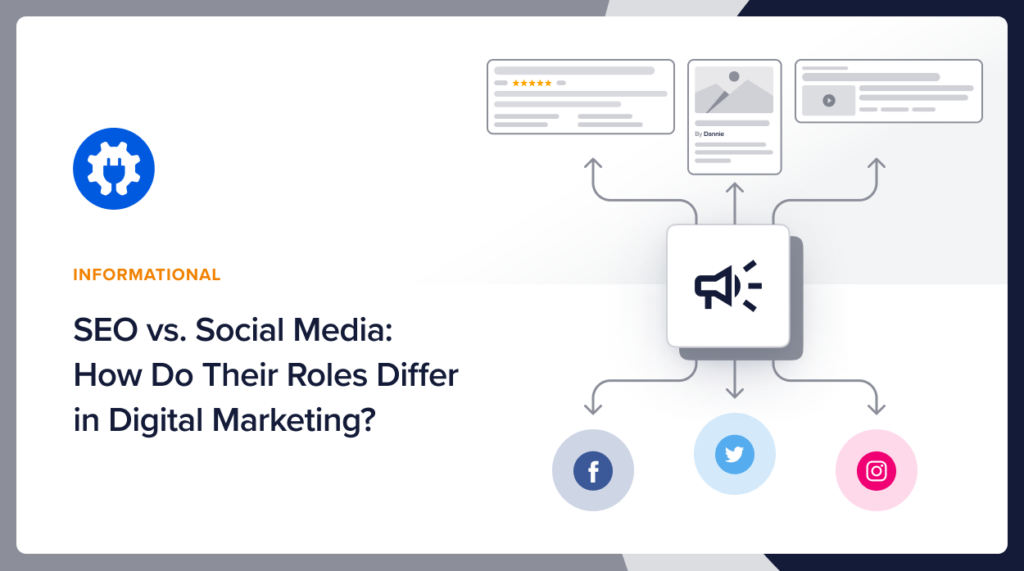

Digital marketing is a transformative approach to promoting products, services, and brands in the online space. In today’s technology-driven world, businesses leverage various digital channels to reach their target audience more effectively and engage with them in a personalized manner.
Some interesting and useful info here! Some of which I’ll work on incorporating into my own site!
Thanks for your feedback Bridgitte. Glad you found it useful!
Good overview of the two
Thanks for weighing in here, Vern. Glad you found it interesting.
Great article, thank you.
Thanks for your kind comment Dominick. I’m glad you found it interesting.
An insightful piece. Simply put, newsfeeds have their role, and SEO its own. If it’s eyes-on-you or your page you want, then social media is the place to start your search for attention. But if it’s conversions, then quality SEO content aimed at those with commercial intent is your go-to. Much thanks!